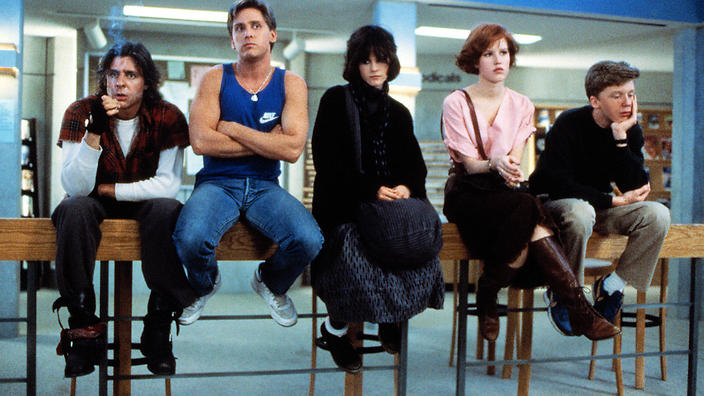by Sydney Gan
“Nothing’s as good as you recall” –William Finn, Falsettos ‘Jason’s Therapy’ (2016)
Youth, in its crux, is defined fundamentally by ignorance. The state of not knowing, that blissful unawareness, to lead life with rose-tinted glasses and exist in a made-believe vacuum devoid of those that are ugly and monstrous. In fiction, the concept of youth serves often as a fatal flaw.
It is Red Riding Hood’s youth that urged her foolish trust under the Big Bad Wolf’s sly persuasion, and Hansel and Gretel’s naivety that marched them straight into the witch’s oven. The ignorance of youth is well discussed in stories. Angela Carter, in her short story The Bloody Chamber, reinforces this motif through her feminist retelling of the folktale Bluebeard, twisting the protagonist’s girlish innocence to portray a larger theme of predatory exploitation and manipulation by an older, ill-intended man. Youth is presented as something detrimental embedded inside characters, an inherent hamartia. They are forced to learn and outgrow themselves—a narrative metamorphosis—in order to emerge in the end, not necessarily victorious, but changed. Those enveloped too far in the vices of youth meet their tragic demise. It is the folly of youth that tipped the poison down Romeo’s throat, the same that drove the ‘happy dagger’ of destruction into Juliet’s chest. To break out of the cocoon, so to speak, is pedestaled as the antidote for childish blindness, the good and right ending to a story.

A deeper dive into the convention of growth as a triumphant ending would uncover an element of sacrifice intrinsic to the act of growing up. There is a give-and-take relationship in this inevitable transaction, where the character must lose something to gain access to the martyred world of adulthood. Taking the most prominent depiction of youth and growing up in literature as an example, J.M. Barrie’s Peter Pan has Wendy and her brothers make a decision: either to remain in the elusive Neverland and never grow up, indulging in their fantastical childhood fantasies of pirates and fairies or to give the utopia of adventure up and instead venture into the ‘real world’. In the end, Wendy elects to go home, along with a small army of Lost Boys, to grow up and enter adulthood. For Wendy to step into womanhood, she has to quite literally leave her childhood behind her, renouncing those that embody it—the boy who never grows up and his island frozen in time. The refusal to release youth and the unblemished beauty that goes with it is often met with misfortune, such as the fatal consequence of Dorian Gray’s withered corpse next to his immaculate painting.
Further bolstering the ecstasy of growth, the imperceptible process of growing up is captured in fiction, and conversely, often in a striking eureka moment. It is conveyed in an explosion of realization, a significantly huge event that stands at the apex of the narrative. It is the whirling bursts of water of the fountain, the elated, beaming rainbow lights illuminating the gloomy evening behind Cher as she realizes that she is in love with Josh in Amy Heckerling’s Clueless, or the emotional group discussion in The Breakfast Club where the hierarchy-bound teenagers in detention are forced to confront the absurdity of high school reality. There is an assumption that when this fateful moment hits, the grand ascension of characters to adulthood commences and the detriments of youth are left behind, shed.
In yet another John Hughes classic Ferris Bueller’s Day Off, Cameron evolves beyond his timid submission to his father with a gesture as dramatic as it can get: hurtling a vintage Ferrari thrown on reverse through a great glass window down to the depths of a forest. Cameron comes of age by learning to take courage of his convictions, no longer allowing unwelcomed societal and familial pressure to mold him into something miserable by taking control and responsibility for the first time in his life. Fiction celebrates the jolting change away from youth, an irreversible, momentous occasion featured to mark the transition to adulthood—a grand display of transition to enlightenment and clarity.

However, a curious contrast can be observed in fiction concerned thematically with youth where characters are already in their adulthood. Growing up is glorified, but those who have long grown out of childhood are often depicted as those jaded and joyless, the antithesis to a carefree existence. In coming-of-age stories, adults are ironically often given the role of the antagonist.
The obsessive Principle Mooney in Ferris Bueller is a prime example, an adult completely enraged by the protagonist’s reckless and adventurous lifestyle. He is hell-bent on exposing the protagonist’s misdeeds, to submit him to the severe authority of adult responsibility. With such a stark contrast between the implications behind the portrayal of youth and adulthood, one might question the very virtue of maturity as a happy ending. Youths are perceived by those who are grown-up either resentfully, influencing an adamance to destroy the liberating ignorant nature of youth, or in a wistful light—the depiction of a great yearning to return to and enjoy the simpler times. This can be seen in Tennessee Williams’ iconic play Sweet Bird of Youth, where Chance Wayne’s stubborn hold over his past costs him his life to the vengeful father of his disgraced ex-lover. The longing of youth, the delusion that life can be rechanneled as it was before, is the tripping stone to a character’s downfall.
This contradiction poses an almost Sisyphean conundrum between the great admiration over maturity as commendable character growth and the absolute dejection illustrated in those who have ‘bested’ childhood. The fictional medium captures these opposite elements and highlights the complexity of character development. It reinforces the dizzying fact that in its context, the very act of growing up contains multitudes. In either depiction, as a defect or a goal, its meaning spans multitudes onto this grand narrative theme to which we can all relate.